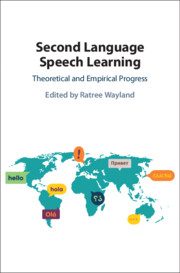Book contents
- Second Language Speech Learning
- Second Language Speech Learning
- Copyright page
- Dedication
- Contents
- Figures
- Tables
- Contributors
- Preface
- Acknowledgments
- Part I Theoretical Progress
- Part II Segmental Acquisition
- Part III Acquiring Suprasegmental Features
- Chapter 9 Relating Production and Perception of L2 Tone
- Chapter 10 Production of Mandarin Tones by L1-Spanish Early Learners in a Classroom Setting
- Chapter 11 Production of English Lexical Stress by Arabic Speakers
- Chapter 12 Variability in Speaking Rate of Native and Nonnative Speech
- Part IV Accentedness and Acoustic Features
- Part V Cognitive and Psychological Variables
- Index
- References
Chapter 11 - Production of English Lexical Stress by Arabic Speakers
from Part III - Acquiring Suprasegmental Features
Published online by Cambridge University Press: 21 January 2021
- Second Language Speech Learning
- Second Language Speech Learning
- Copyright page
- Dedication
- Contents
- Figures
- Tables
- Contributors
- Preface
- Acknowledgments
- Part I Theoretical Progress
- Part II Segmental Acquisition
- Part III Acquiring Suprasegmental Features
- Chapter 9 Relating Production and Perception of L2 Tone
- Chapter 10 Production of Mandarin Tones by L1-Spanish Early Learners in a Classroom Setting
- Chapter 11 Production of English Lexical Stress by Arabic Speakers
- Chapter 12 Variability in Speaking Rate of Native and Nonnative Speech
- Part IV Accentedness and Acoustic Features
- Part V Cognitive and Psychological Variables
- Index
- References
Summary
The present study investigated the production of lexical stress by native speakers of English (NE), Arabic learners of English (ALE), and native speakers of Arabic (NA). In the first experiment, minimal pairs (e.g., ‘con.flict, con.’flict) were recorded by 8 native speakers of English and 16 (8 advanced and 8 beginning) learners. For comparison, a second experiment examined acoustic cues used to indicate stress in 8 native Arabic speakers. In both experiments, four acoustic cues were examined: duration, fundamental frequency, amplitude, and second formant frequency. Results showed that NE consistently used all four cues to signal stress, with longer duration, higher fundamental frequency, higher amplitude, and less reduced vowel quality for stressed syllables. Advanced ALE, but not the beginning ALE, made distinctions in duration and amplitude similar to the duration and amplitude cues used by NE. For fundamental frequency, both advanced and beginning ALE produced even higher fundamental frequency values for stressed syllables than NE and both learner groups produced full (unreduced) vowels in stressed and unstressed syllables. Implications for acoustic cues to lexical stress in English as a second language are discussed.
- Type
- Chapter
- Information
- Second Language Speech LearningTheoretical and Empirical Progress, pp. 290 - 311Publisher: Cambridge University PressPrint publication year: 2021
References
- 2
- Cited by

